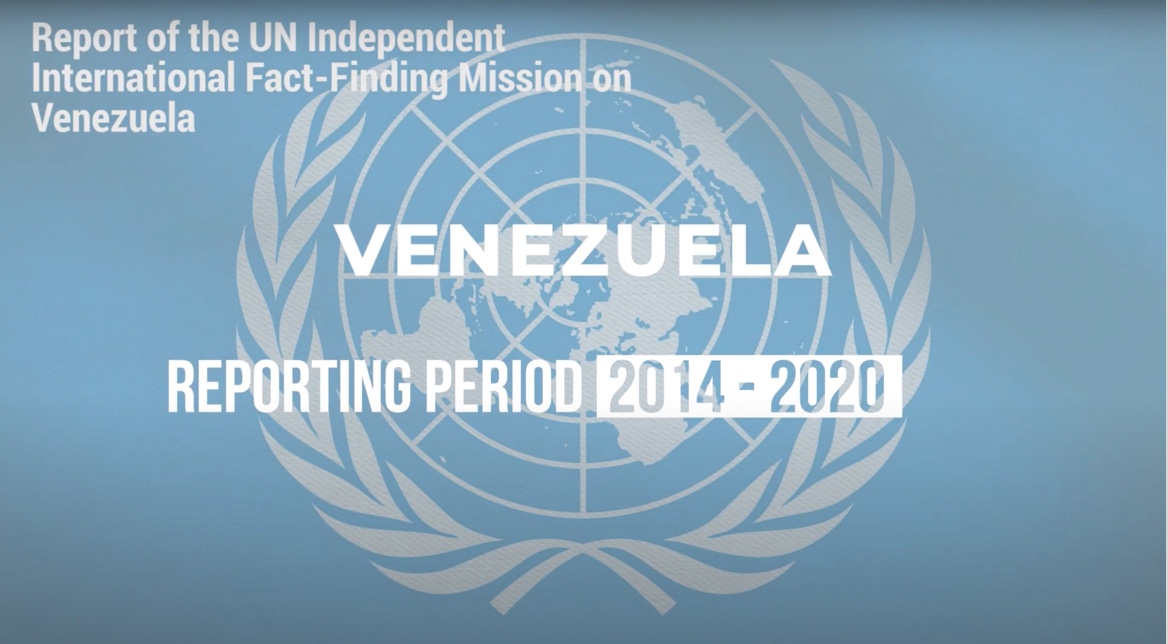 Video summarising the general situation in the country based on the findings of the UN Fact-Finding Mission (1:21 min). Watch the video to find out more.
Video summarising the general situation in the country based on the findings of the UN Fact-Finding Mission (1:21 min). Watch the video to find out more.
Human rights defenders engage the UN to push for the creation of a Fact-Finding Mission, which finds evidence of crimes against humanity committed by high officials.
As President Nicolas Maduro continues to strengthen his grip on power and refuses to hold free and fair elections in Venezuela, the efforts of human rights defenders have grown stronger in the international arena.
With a collapsing economy, violence rising, and millions of people attempting to flee to neighbouring countries, the situation in Venezuela has become more challenging every day. However, the response from Maduro’s government has not only been inadequate in dealing with the crises, but significantly hostile toward those who speak out and demand change.
Restricting access to information has been a key strategy for the government to maintain power. The erosion of internet infrastructure, strict regulations on providers, and intimidation toward journalists and individuals sharing information online which is deemed to be against the ruling party, are tactics employed by the regime, as well as strong public surveillance activities resulting in judicial persecution of users. The government has a monopoly of official media channels (radio and TV). The government also used the Covid-19 as a pretext to censor and silence the media, as a means to restrict criticism.
Political leaders, civil society organisations, victims and human right defenders have expressed concerns about the type and extent of human rights violations in the country for many years, in particular since protests were held in 2014 and 2017, during which dozens were killed and arbitrarily detained.
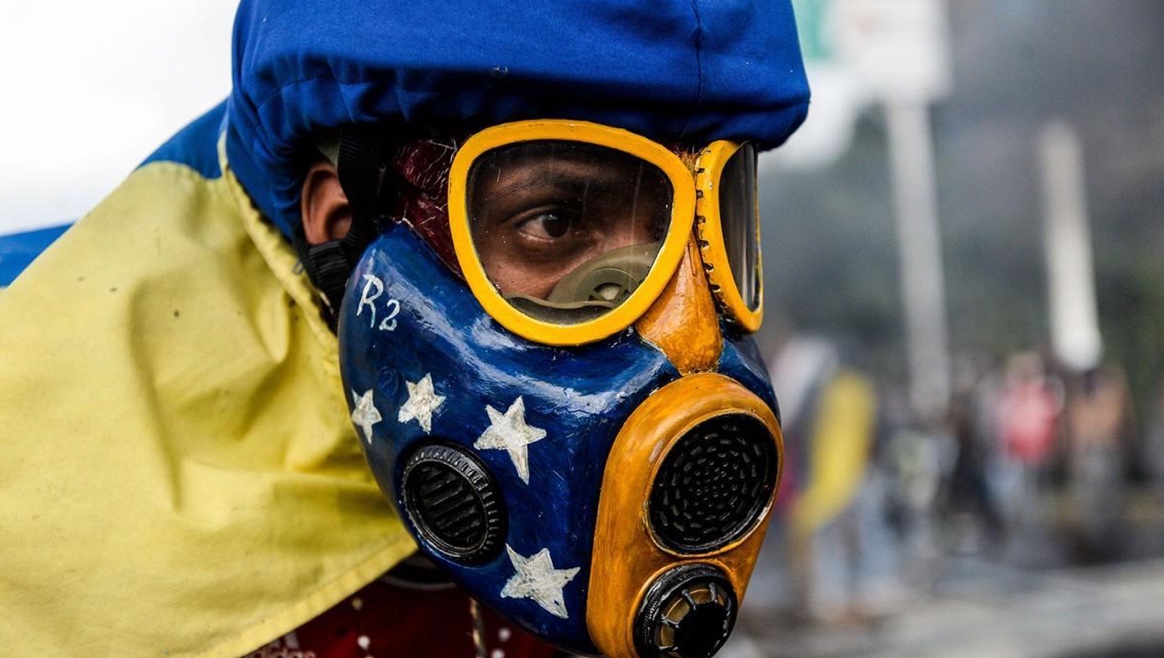 Photo: A demonstrator wears a gas mask in a clash with police during the "Towards Victory" protest against the government of President Nicolas Maduro in Caracas. By Federico Parra. 10 June 2017
Photo: A demonstrator wears a gas mask in a clash with police during the "Towards Victory" protest against the government of President Nicolas Maduro in Caracas. By Federico Parra. 10 June 2017
2014 and 2017 protests
The waves of protests in 2017 saw thousands injured and at least 125 people killed. Increasingly violent clashes put Venezuela once again under the international spotlight as new images emerged daily showing closed streets, burning government buildings and repression at the hands of the military. International human rights organisations, like Human Rights Watch and Amnesty International documented the human rights violations and abuses, and international media, such as Reuters, The Guardian, BBC, Al-Jazeera and CNN provided extensive coverage of the situation.
This round of political stability was similar to that seen a few years earlier in 2014. In that year, a pattern of serious abuse in Venezuela was documented in a Human Rights Watch report.
“In 45 cases, we found strong evidence of serious human rights violations committed by Venezuelan security forces, which included violations of the right to life; the prohibition on torture and cruel, inhuman and degrading treatment; the rights to bodily integrity, security and liberty; and due process rights”
Human Rights Watch, Punished for Protesting: Rights Violations in Venezuela’s Streets, Detention Centres, and Justice System (2014)
The report concluded that violations to human rights were systematic rather than isolated, contrary to what high officials within the country publicly stated. The report documented that the State willingly allowed pro-government armed groups to attack civilians and local defenders, and in some cases collaborated with such groups. The judicial system was also found to repeatedly turn a blind eye toward the issues. The Venezuelan authorities were called to investigate the violence that took place during the demonstrations.
Post 2017, the situation continues:
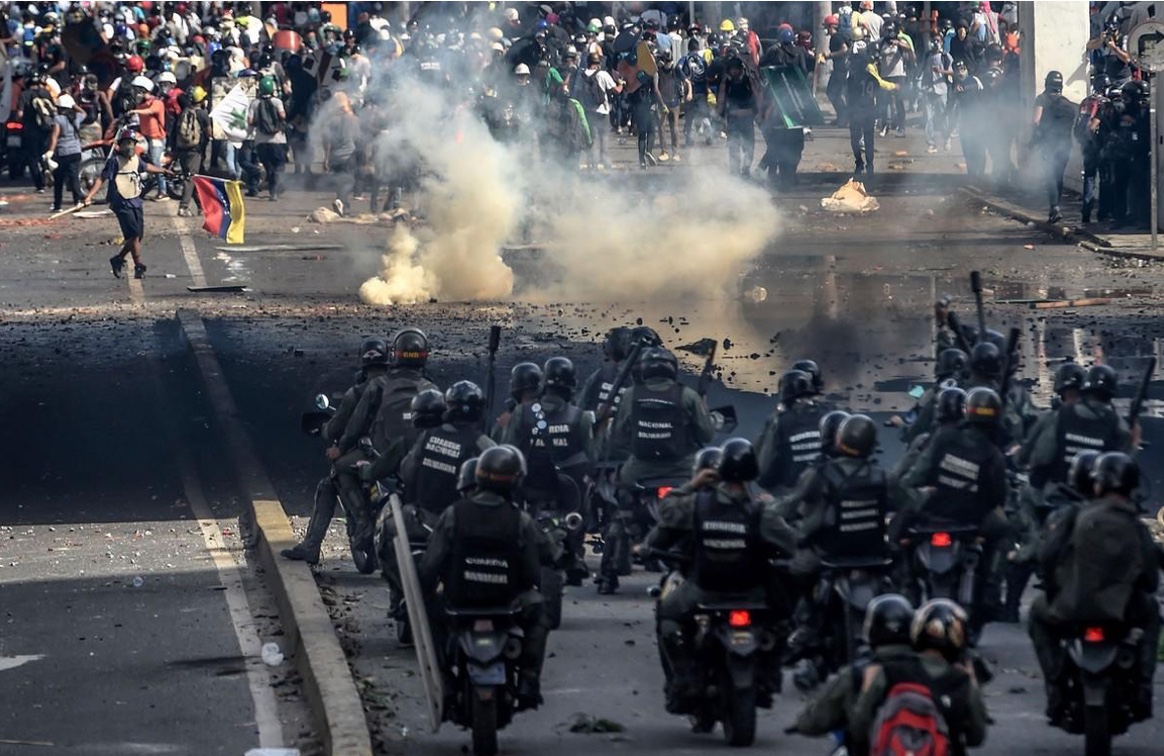 Photo: Riot police officers confront activists during a demonstration against Venezuelan President Nicolas Maduro. By Juan Barreto. 26 May 2017
Photo: Riot police officers confront activists during a demonstration against Venezuelan President Nicolas Maduro. By Juan Barreto. 26 May 2017
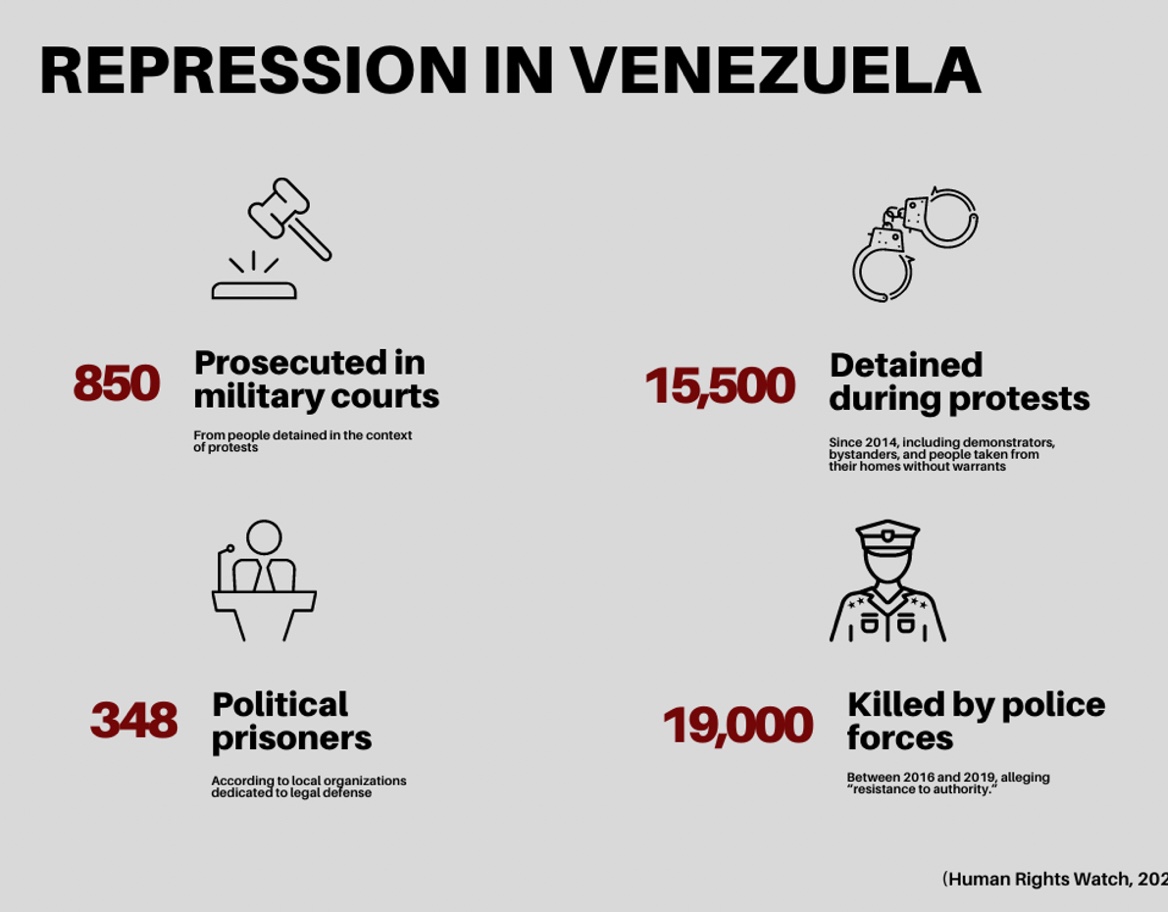
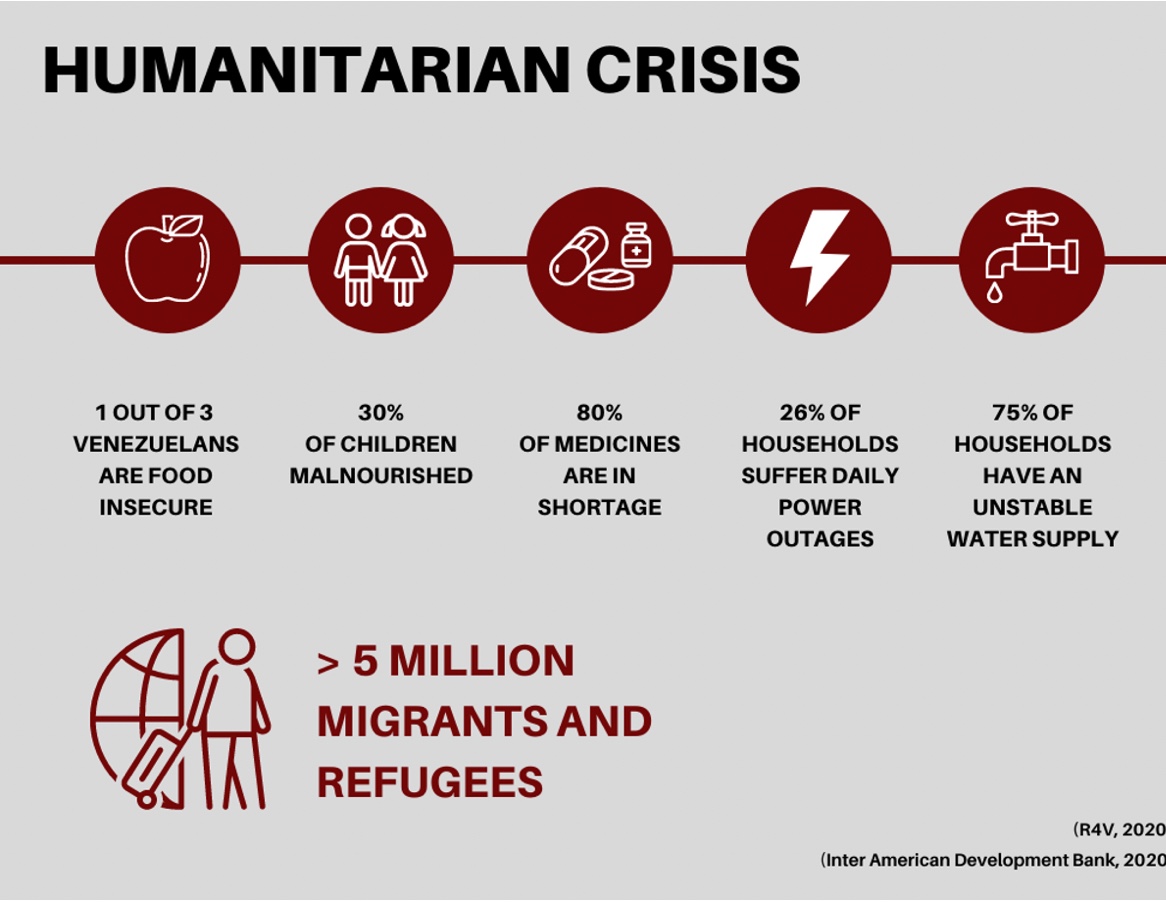
Facing strong reprisals from Maduro’s governments, local civil society organisations and activists had few options to raise awareness about human rights violations through national media outlets, and little likelihood of justice for victims from a largely co-opted judicial system. Although NGOs were sometimes allowed to provide some humanitarian assistance to the population in need, any steps taken by them in the political landscape triggered a hostile response from the part of the ruling party.
Human rights defenders in Venezuela:
expressed concerns about human rights violations in Venezuela for years, in particular since the protests of 2014 and 2017 during which dozens were killed and detailed arbitrarily.
initiated advocacy efforts by collaborating with international human rights organisations and international media, raising awareness through social media, and taking part in debates at regional multilateral bodies. (See section above on Issue and Context.)
in 2015, provided information to the Inter-American Commission of Human Rights on the dangers and harassment faced by human rights defenders in Venezuela, including specific cases and evidence of allegations against the Maduro government.
individually and collectively submitted information to the UN Universal Periodic Review (2016) of Venezuela.
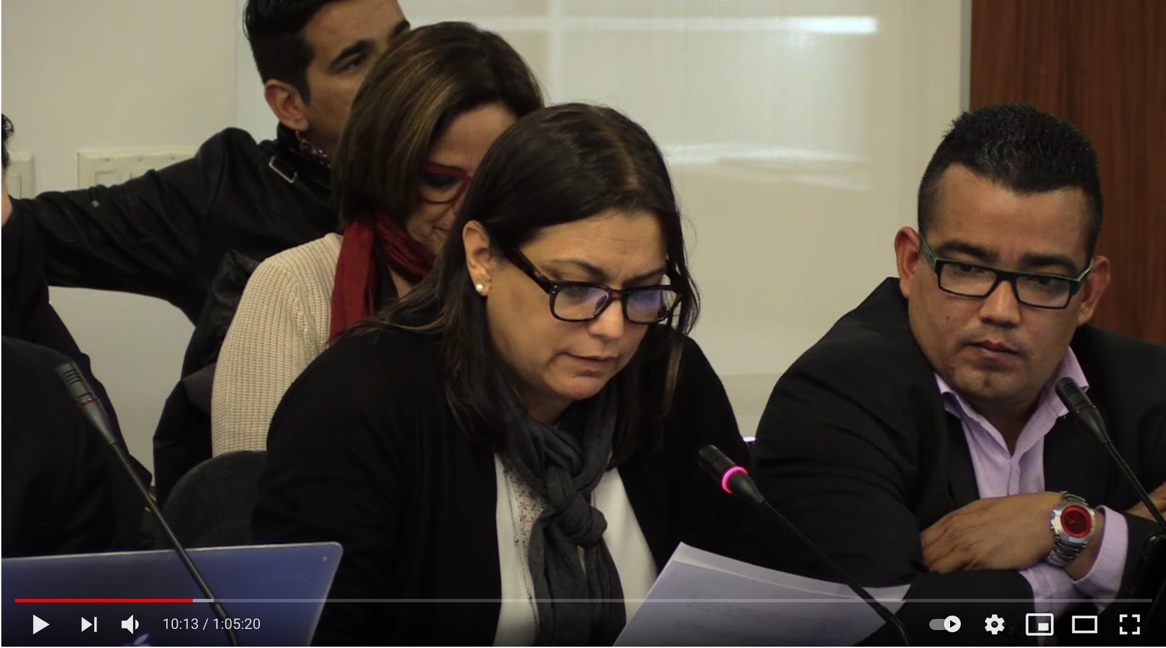 A group of Venezuelan NGOs participate in the 156th session of the Inter-American Commission for Human Rights, denouncing systematic harassment toward defenders. 19 October 2015.
A group of Venezuelan NGOs participate in the 156th session of the Inter-American Commission for Human Rights, denouncing systematic harassment toward defenders. 19 October 2015.
These activities represented a continuous effort made by a large number of Venezuelan NGOs and individual defenders and through different fronts in the international arena.
Despite this, there seemed to be little appetite initially to put Venezuela on the agenda of the Human Rights Council.
Venezuelan human rights defenders urged the Office of the High Commissioner for Human Rights (OHCHR) to report on the human rights situation in Venezuela, even if not mandated to do so by the Human Rights Council. As a result of this pressure, and despite Venezuela denying them access to the country, OHCHR produced two reports, in 2017 and 2018 which put a spotlight on Venezuela. It provided recommendations – including one calling for the establishment of a Commission of Inquiry - that states and civil society could reference thereby building pressure for the Human Rights Council to take action. Finally, in September 2019 the Human Rights Council adopted a resolution which mandated the establishment of a Fact-Finding Mission. (See section below on What happened at the UN?)
Throughout this process, human rights defenders continued to engage with the UN human rights mechanisms, providing key information including to OHCHR for its reports, as well as lobbying states, and collaborating with other key stakeholders (such as other NGOs, media and international institutions, such as the International Criminal Court) at all levels. As options to engage with regional human rights mechanisms became fewer, the international sphere became all the more important to Venezuelan civil society.
Human rights defenders also provided key information to the Fact-Finding Mission once it was created. Their role was crucial in offering appointed experts a context in which to carry out their investigations, as well as a deeper analysis of the situation and specific cases to further explore.
Office of the High Commissioner for Human Rights
As a result of the pressure from Venezuelan human rights defenders since the 2014 protests urging OHCHR to look into the deteriorating human rights situation in Venezuela, OHCHR unilaterally set up its own team in 2017 which produced two groundbreaking reports.
In the August 2017 OHCHR report, the OHCHR presented its findings on the violations committed by state and non-state actors in the context of massive protests. The report described numerous instances of excessive use of force, killings, raids, destruction of property, torture, arbitrary detention, repression of the media, and attacks to the opposition.
In a subsequent June 2018 OHCHR Report, the OHCHR called on the Human Rights Council to establish a team of independent experts to review the situation in Venezuela. This provided States with an interest in the situation (particularly, the Lima Group*) with a springboard for calling on the Human Rights Council to establish monitoring and reporting mandates.
*The Lima Group, constituted initially by 12 Latin American nations, is a multilateral coalition established in 2017 with the goal of finding a solution to the Venezuelan crisis. Among other things, it demands the liberation of political prisoners and criticizes the fracture of democratic order (Deutsche Welle, 2021)
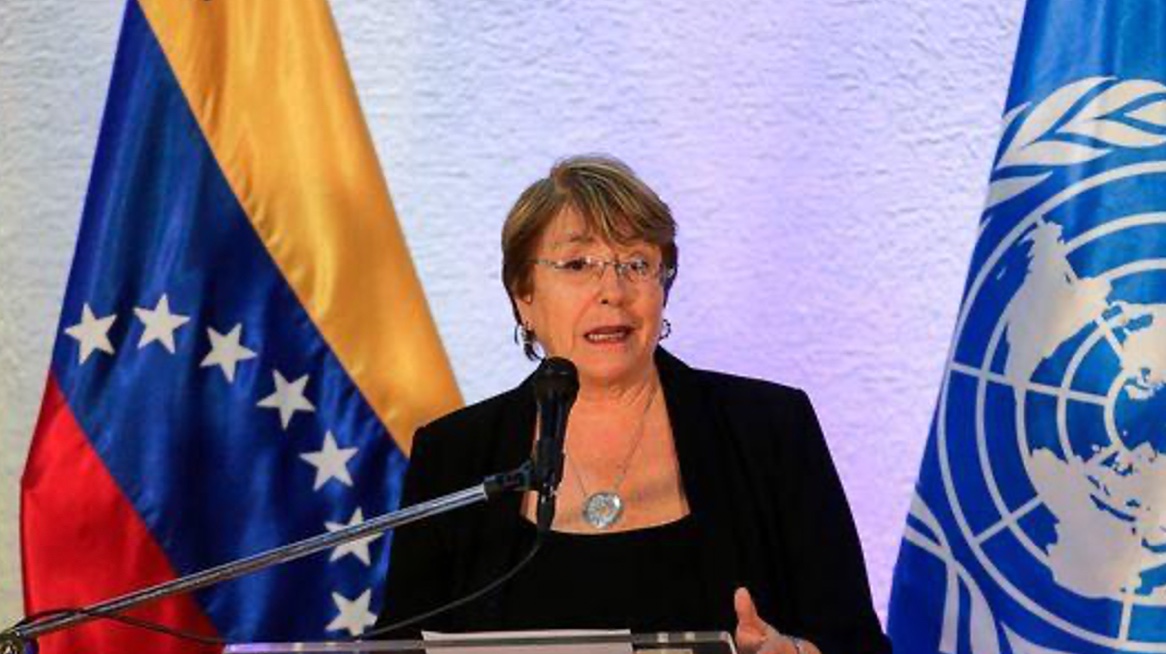 Photo: Michelle Bachelet, United Nations high commissioner for human rights, visited Venezuela in June, 2019. By Cristian Hernandez.
Photo: Michelle Bachelet, United Nations high commissioner for human rights, visited Venezuela in June, 2019. By Cristian Hernandez.
Human Rights Council
Human rights defenders played a key role in pushing the Human Rights Council to include the human rights situation of Venezuela on the agenda. During the regular sessions of the Council, national and international NGOs, as well as individual victims and activists, delivered statements, signed open letters, and submitted information to different UN human rights mechanisms - all strategies that can be used by defenders to bring their issues of interest to the HRC agenda. This resulted in a series of resolutions adopted by the Council requesting reports on the situation in Venezuela, the establishment of the Independent International Fact-Finding Mission, and its subsequent renewal in 2020.
At this session, the Human Rights Council adopted HRC Resolution L.1/Rev.1 which called on the UN High Commissioner Michelle Bachelet to investigate the grave human rights situation in Venezuela. The resolution - led by members of the Lima Group and co-sponsored by at least 42 countries - expresses deep concern at the serious human rights violations committed in a context of a political, economic, social and humanitarian crisis. It is the first resolution of the HRC ever to focus on Venezuela, a State that has put huge effort over the years into avoiding scrutiny at the international level, while actively seeking to weaken the UN human rights mechanisms.
At this Council session on 10 September 2018, a joint oral statement on Venezuela by ISHR and 82 organisations was delivered by Venezuelan human rights defender, Alí Daniels. The NGOs raised concerns about Venezuela’s lack of action in regard to UPR recommendations, including in regard to accepting visits from Special Procedures.
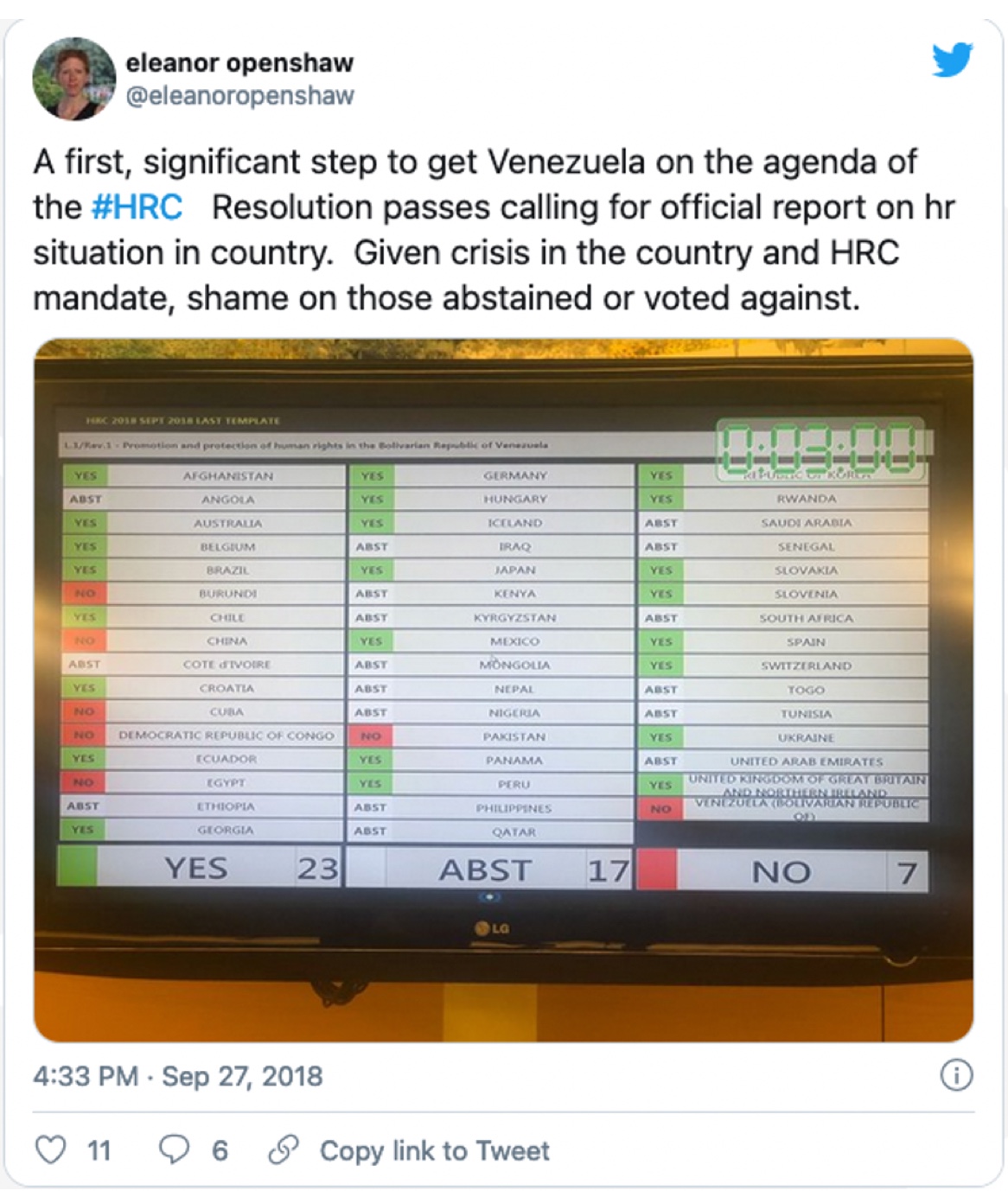
September 2019 - HRC 42nd regular session - Resolution 42/25 on Venezuela - creation of the Fact-Finding Mission
Responding to the findings in the OHCHR reports of 2017 and 2018, the Human Rights Council adopted Resolution 42/25 on 27 September which mandated the establishment of an Independent International Fact-Finding Mission to
“investigate extrajudicial executions, enforced disappearances, arbitrary detentions, and torture and other cruel, inhumane or degrading treatment since 2014, with a view to ensuring full accountability for perpetrators and justice for victims”,
and to present its conclusions at the 45th regular session of the Council in September 2020. Organisations, groups and individuals were thus invited to submit information for the subsequent report of the Fact-Finding mission. The resolution also requested OHCHR to continue compiling and presenting oral and written reports on the situation in Venezuela in subsequent HRC sessions, including in regard to the independence of the judicial system. (For the findings of the Fact-Finding Mission, see the section on Outcomes and impact.)
In 2019, Venezuela also announced its candidacy for membership of the Human Rights Council, a decision highly criticised by defenders and other States because of Venezuela’s human rights record. The bid for membership was challenged only by Costa Rica, a move that ISHR defined as “the result of sustained advocacy by Venezuelan human rights defenders who have demanded States take position in favour of the respect of human rights in the country”. Later that year, Venezuela was voted to the Council with a very narrow majority. The process placed a spotlight on Venezuela and its human rights record.
Prior to the adoption of Resolution 42/45, and in conjunction with the Human Rights Council 42nd session, on 9 September 2019, 11 civil society organisations collaborated to hold a side event entitled Why is a UN Commission of Inquiry needed on Venezuela? at the UN headquarters in Geneva. International NGOs partnered with local defenders to host a discussion panel that reviewed the situation in the country and pushed for action at the 42nd Council session.
In addition on 17 September 2019, 11 Venezuelan and international human rights organizations that had monitored and documented Venezuela’s spiraling human rights and humanitarian emergency for years came together to issue an open letter urging the Council to establish a Commission of Inquiry on Venezuela during its 42nd session.
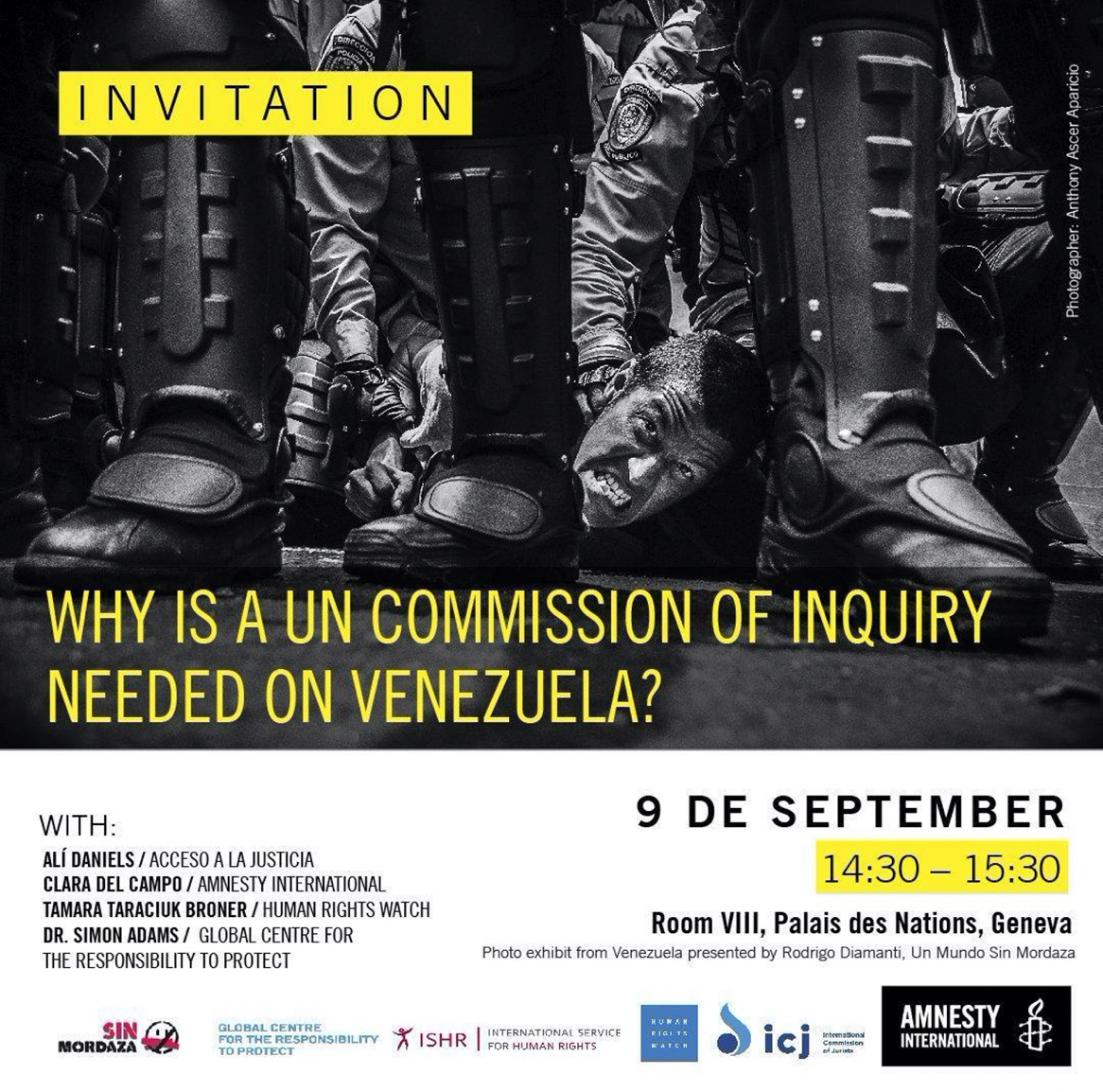 Photo: Invitation to Human Rights Council Side Event “Why is a UN Commission of Inquiry needed on Venezuela?” By: Amnesty International and others. 9 September 2019
Photo: Invitation to Human Rights Council Side Event “Why is a UN Commission of Inquiry needed on Venezuela?” By: Amnesty International and others. 9 September 2019
During this session, the Fact-Finding Mission presented its report to the Human Rights Council (See findings of the Fact-Finding Mission in the section below on Outcomes and Impact.)
In October 2020, the HRC in its 45th regular session adopted Resolution 45/20, which renewed the mandate of the Fact-Finding Mission for an additional two years. In the resolution, the Council acknowledged the existence of various human rights violations in Venezuela, specifically noting grounds to consider certain violations as constituting crimes against humanity (a charge that could be persecuted by the International Criminal Court): murder, imprisonment and other severe deprivation of physical liberty, torture, rape and other forms of sexual violence, enforced disappearance of persons, and other inhumane acts of a similar character intentionally causing great suffering or serious injury to body or to mental or physical health.
This represented a significant step in the fight for human rights in Venezuela. For years, NGOs and victims had appealed to international actors with little to no response. The Fact-Finding Mission finally provided a platform through which their demands were acknowledged, and this pushed the Council to action.
Prior to the adoption of Resolution 45/20, and in conjunction with the 45th regular session of the Council, Venezuelan defenders expressed their opinions on the findings of the Fact-Finding Mission and provided updates. Watch the video.
“Cases of serious human rights violations continued during the Covid-19 pandemic...there are still illegitimate judicial proceedings, disappearances, torture and ill-treatment, arbitrary detentions and politically motivated persecution in a pre-electoral context.”
Marysabel Rodríguez, from Espacio Público
In addition, in August 2020 before the commencement of the 45th regular session, a group of 84 national and international NGOs published an open letter calling on the Human Rights Council to extend and expand the mandate of the Fact-Finding mission to Venezuela. Through this letter, signatories highlighted the key role of the mission in constructing a path toward accountability of perpetrators by compiling and analyzing evidence for future prosecutions. The intent was to call for the council to address the mandate renewal question at the 45th regular session.
Statements of civil society organisations continue to be presented at Human Rights Council sessions
Special Procedures
In 2019, 17 Venezuelan organisations submitted a joint letter to the Working Group on Arbitrary Detentions asking the experts to follow up on requests to visit the country. This was particularly useful to keep the pressure on the Maduro government to respond to the requests from Special Procedures.
On 29 January 2021, 66 Venezuelan NGOs addressed an open letter (in Spanish) to the UN Special Rapporteur on sanctions. Welcoming the visit of the Special Rapporteur to the country, the defenders expressed concerns that the Maduro government was selecting experts to cooperate with whose mandates were in line with government political interests.
“It is a notorious fact that this government uses the sectoral sanctions imposed by the United States of America to hide its responsibility in the complex humanitarian crisis, caused by years of large-scale corruption, which have meant crimes against the patrimony of the nation that today are still unpunished”
WOLA, 3 February 2021
Signatory NGOs reinstated their views that the government had criminalized defenders’ cooperation with other mechanisms and made specific requests and suggestions on how to allow the visit to have a more comprehensive and impartial approach to the situation in Venezuela.
Universal Periodic Review
Human rights defenders in Venezuela were active in making submissions to the last Universal Periodic Review of the country.
Venezuela was last subject to the Universal Periodic Review in 2016 (and will be again in 2022). In its second review cycle, 519 NGOs submitted documents for consideration. Civil society organisations were able to communicate their concerns and recommendations to the review body, highlighting the situation regarding vulnerable groups, civil and political rights, and economic, social and cultural rights. National defenders collaborated with international NGOs, who also submitted documents for the review, to further validate and enrich the analysis of the situation. All reports were later compiled into a comprehensive factsheet that served as a resource for the final document.
2019 OHCHR Official Visit to Venezuela
As a result of pressure at the international level, the Human Rights Council adopted a resolution which put pressure on the Venezuelan government to accept an official visit from the High Commissioner for Human Rights, Michelle Bachelet - which was a rare and significant opportunity for human rights defenders, victims and NGOs to meet with her and her team to directly communicate their experiences in the country. In 2019, activists and organisations attended meetings and and discussed with her various national issues such as the violation of children’s rights, the undermining of civil rights, the HIV epidemic, patterns of torture and extrajudicial killings, and much more.
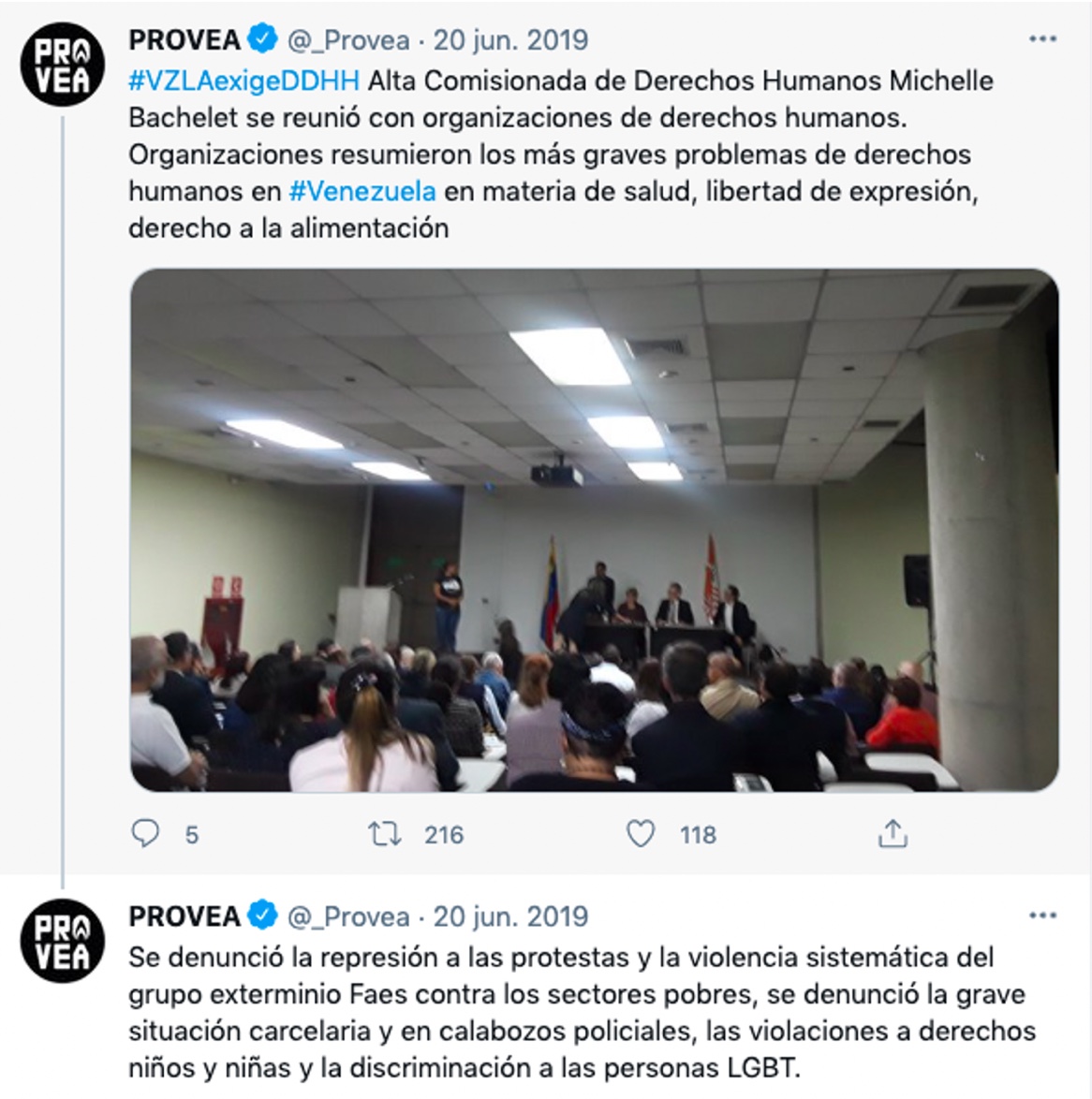
English Translation of Tweet:
#VZLADemandsHumanRights High Commissioner for Human Rights Michelle Bachelet met with human rights organisations. Organisations summarized the most serious human rights problems in #Venezuela regarding health, freedom of expression, right to food.
We spoke out against the repression of protests and the systematic violence of the extermination group Faes against the poor sectors, as well as the serious situation in prisons and police jails, violations of children's rights, and discrimination against LGBT people.
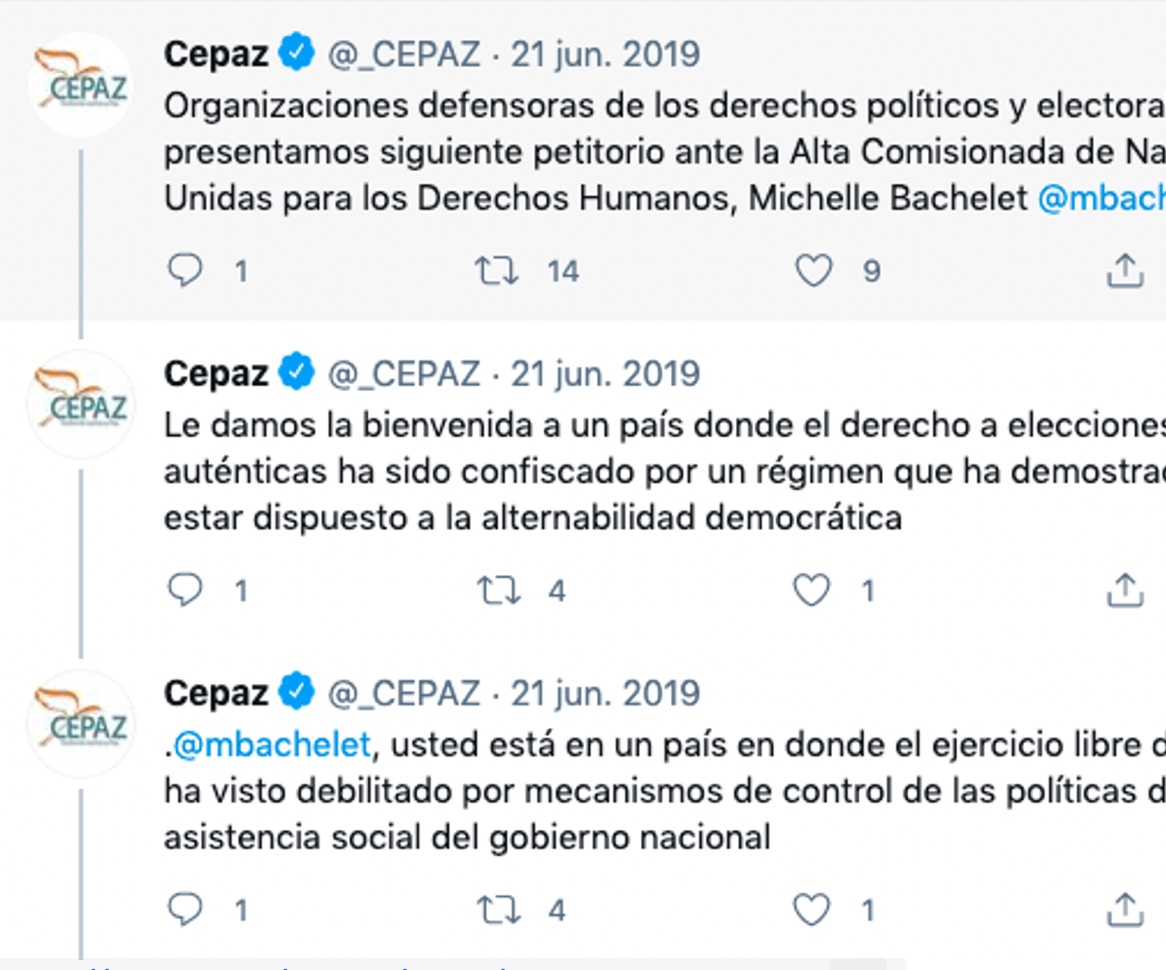
English Translation of Tweets:
Organisations defending political and electoral rights presented the following petition to the United Nations High Commissioner for Human Rights, Michelle Bachelet @mbachelet
We welcome you to a country where the right to genuine elections has been denied by a regime that has shown itself to be unwilling to respect democratic change.
@mbachelet, you are in a country where the free exercise of the vote has been weakened by mechanisms of control bound up with social assistance policies of the national government.
The visit of the High Commissioner also resulted in the establishment of a temporary OHCHR presence in the country (a permanent arrangement is still being negotiated).
On the back of the visit, OHCHR produced a report for the Human Rights Council and served as a basis for upcoming resolutions on Venezuela.
For more information:
2020 Findings of the UN Fact-Finding Mission
Human Rights Council Resolution 42/25 adopted in September 2019 mandated the establishment of a Fact-Finding Mission to “investigate extrajudicial executions, enforced disappearances, arbitrary detentions and torture and other cruel, inhuman or degrading treatment since 2014 with a view to ensuring full accountability for perpetrators and justice for victims”.
The UN Fact-Finding Mission on Venezuela presented its first report to the Human Rights Council in October 2020, during its 45th regular session, which found the Venezuelan government to have implemented targeted political repression, committed human rights abuses in the context of protests (such as extrajudicial killings, torture, arbitrary detention and violations to due process), and influenced the judicial branch to avoid accountability. It concluded that “the mission has reasonable grounds to believe that the following crimes against humanity were committed in the Bolivarian Republic of Venezuela in the period under review”- a category of crimes defined under the 1998 Rome Statute that establishes the International Criminal Court.
The Fact-Finding Mission also recommended that “states should consider initiating legal actions against individuals responsible for the violations and crimes identified in the report, in accordance with their relevant domestic legislation”. It also suggested the Office of the Prosecutor of the International Criminal Court to “take into account the victims’ needs to have justice served in a timely fashion”.
“[The findings of the Fact-Finding Mission are] a milestone for the victims of human rights violations...the much anticipated and hard-hitting report of the Fact-Finding Mission on Venezuela endorses this serious denouncement and supports the thousands of victims in their pursuit of justice that has been denied to them in their country”.
Erika Guevara-Rosas, Director of Amnesty International for the Americas
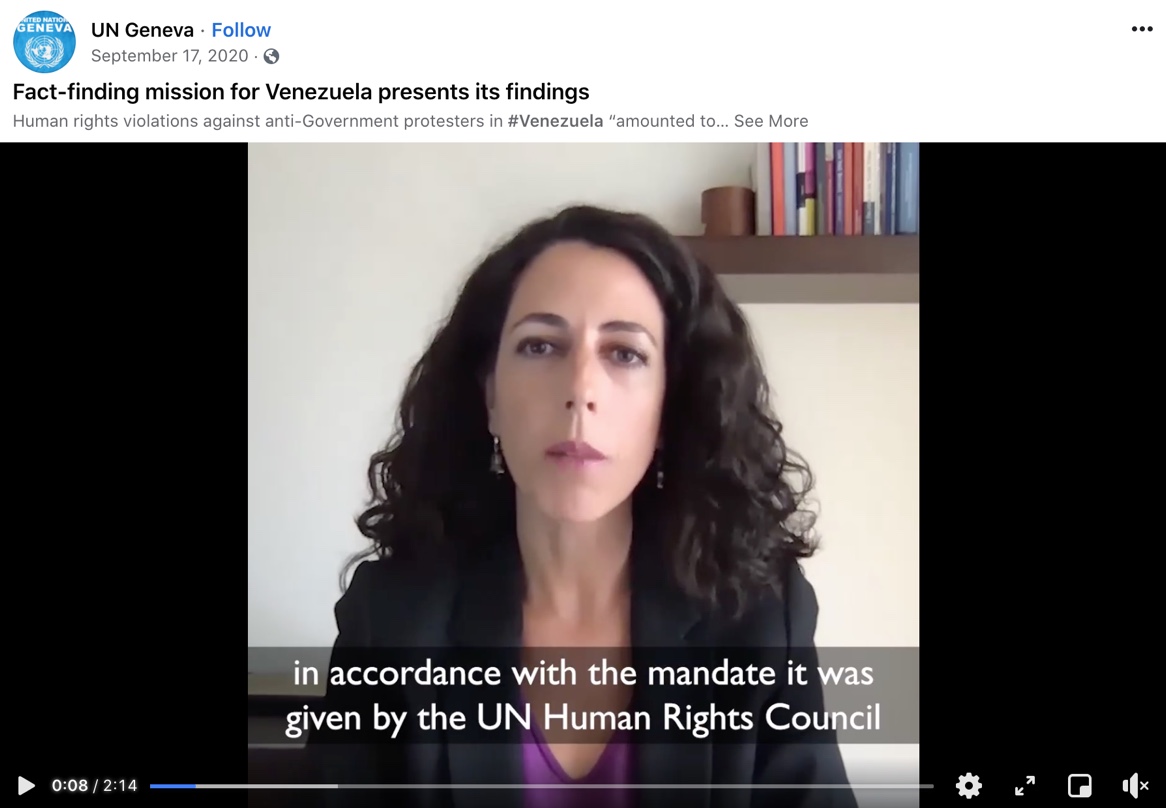 Short video (2:14 min) posted by UN Geneva, in which members of the Fact-Finding Mission presents key findings.
Short video (2:14 min) posted by UN Geneva, in which members of the Fact-Finding Mission presents key findings.
For the full report of the UN Fact-Finding Mission on Venezuela presented to the Human Rights Council at its 45th regular session on 16 September 2020, see the longer video (53 mins)
Find out more:
Other Human Rights Mechanisms
INTERNATIONAL CRIMINAL COURT
Since 2018, prosecutors from the International Criminal Court have stated their interest in the human rights situation of Venezuela. The ICC opened Preliminary Examinations aimed to review “crimes allegedly committed in this State Party since at least April 2017, in the context of demonstrations and related political unrest”.
REGIONAL HUMAN RIGHTS MECHANISMS
In its resolutions, the Human Rights Council stated its interest in collaborating with the regional human rights mechanisms, in this case, the Inter-American Commission of Human Rights. The Council acknowledged the important work of the regional mechanism in monitoring the situation in the country and has urged the Venezuelan government to comply with its requests, allowing it full access to perform needed inquiries (See HRC resolutions in What happened at the UN? Read more on the submissions made by human rights defenders to the Inter-American Commission in 2015 in the section What did human rights defenders do?)


By pushing for the creation of human rights mechanisms (in this case, the Fact-Finding Mission), Venezuelan human rights defenders gained a platform where they could submit their own analysis and perspective on the problem. This was done via open letters, submissions to reports and review by UN bodies, written and oral statements, by national NGOs working in collaboration, and with international NGOs.
Such a strategy can be useful in other national contexts in order to ensure that Human Rights Council decisions are informed by actors on the ground who profoundly understand the evolving reality faced by the people.
In a context of high political sensitivity where State interests obstruct the road to action for the defense of human rights, it can be useful to kick-start the process through another actor. In this case, Venezuelan defenders engaged with OHCHR, which was able to conduct substantial investigations and provide further evidence of the situation in the country. With the hard-hitting 2017 and 2018 OHCHR reports on the human rights situation in the country, momentum was created for action by states to push forward with the creation of a Fact-Finding Mission.
Sustained engagement is critical to address systematic ongoing violations. It was crucial for civil society organisations in Venezuela to keep information flowing as the situation develops. The creation of the HRC mandated fact-finding mission is a major accomplishment, but its work is just a tool to move toward the outcome sought, which is accountability of perpetrators and the eradication of impunity for human rights violations. By continuously presenting updates and pushing for further action, human rights defenders can ensure that the momentum is not lost and that pressure from a variety of stakeholders (UN bodies, other States, media and international NGOs) is mounted.
Although the information brought to light by the Fact-Finding Mission and the OHCHR reports represent a great leap in the fight for human rights in Venezuela, there has been little progress in the achievement of ultimately desired objectives.
All the while threats and attacks against civil society in the country have intensified. Since November 2020, the government forcibly entered the offices of civil society organisations and publicly threatened defenders, NGO bank accounts have been frozen, and arrest warrants issued for aid workers. UN experts have expressed concern about the situation and defined it as systematic persecution and stigmatisation and NGOs expressed solidarity with Venezuelan human rights defenders.
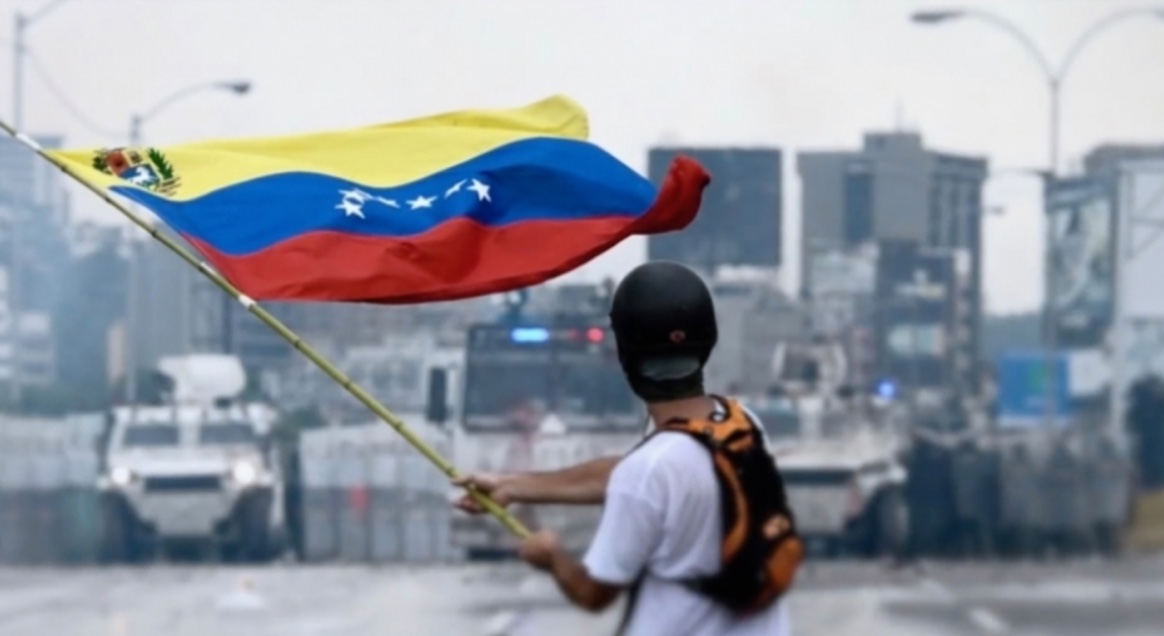
The Maduro regime still enjoys control of political power in the country, there have been no announcement of free and fair elections in the near future, internationally mediated negotiations between the opposition and the government have reached a deadlock, and perpetrators of human rights violations have not yet been held accountable. Human rights defenders continue to work for justice, equality and accountability.
At the 46th regular session of the Human Rights Council, following the recent renewal of the mandate of the UN Independent International Fact-Finding Mission on Venezuela and with the ongoing work of OHCHR in the country, the Human Rights Council received three oral updates. The High Commissioner reported on cooperation between OHCHR and Venezuela and on the human rights situation in the country, and the Chair of the fact-finding mission spoke of accountability efforts for past violations. Member states reiterated the need for a permanent office of the OHCHR in the country and highlighted the importance of continued monitoring of the situation in anticipation of the next report of the Fact-Finding Mission in September 2021.
‘Oral updates provide members with the opportunity to track cooperation by Venezuela and the implementation of UN recommendations to the country,’ said ISHR’s Eleanor Openshaw.
More information on the Fact-Finding Mission can be found on the OHCHR webpage.